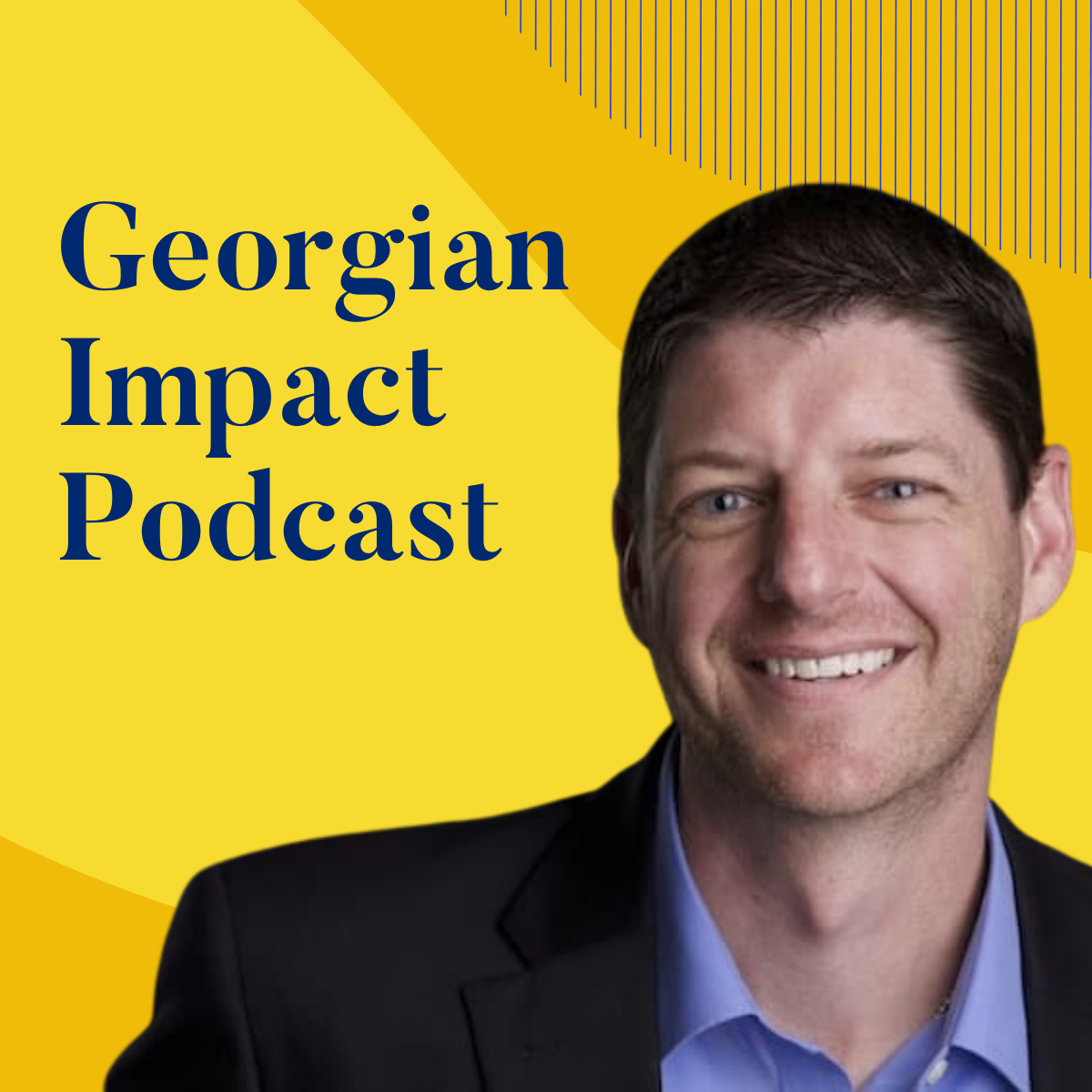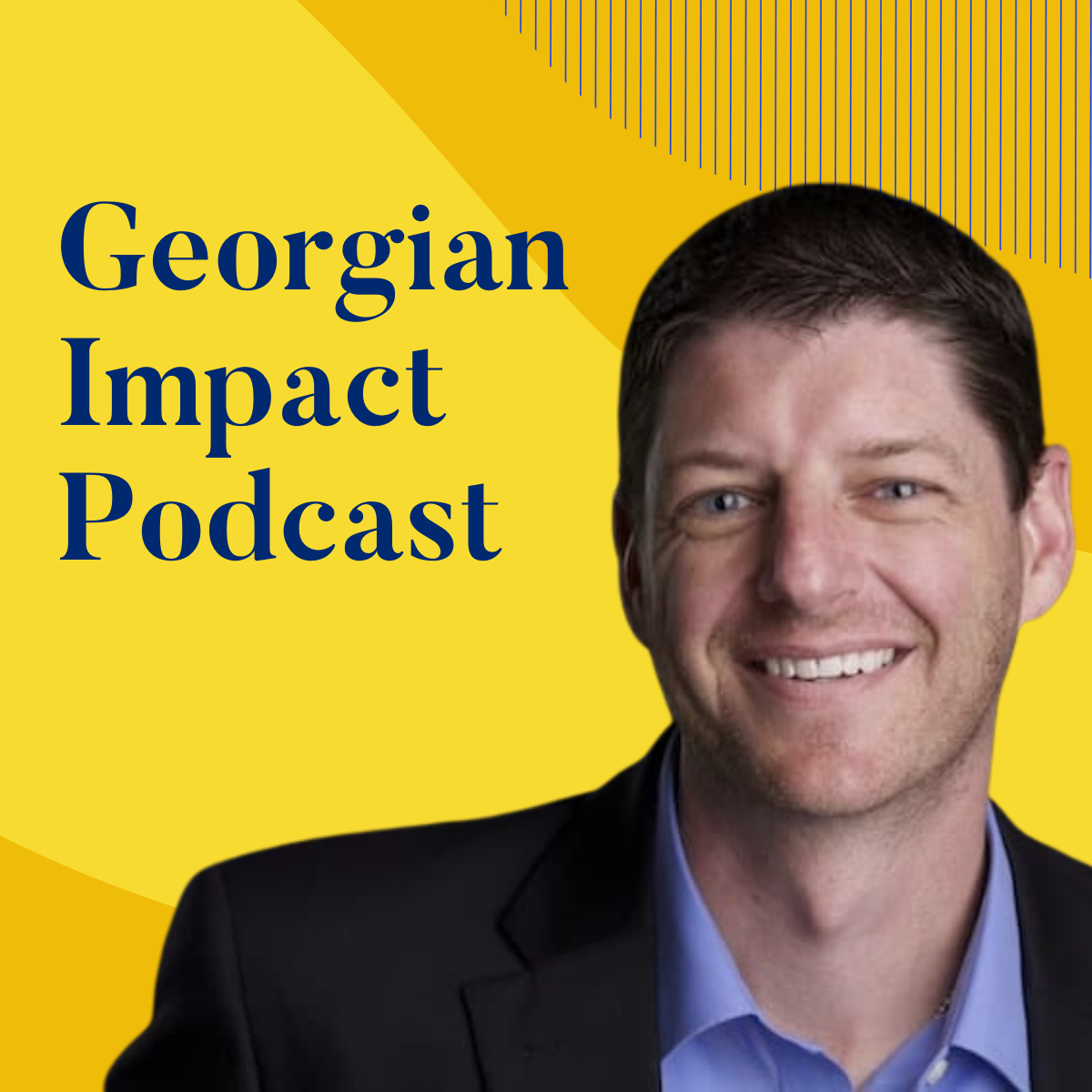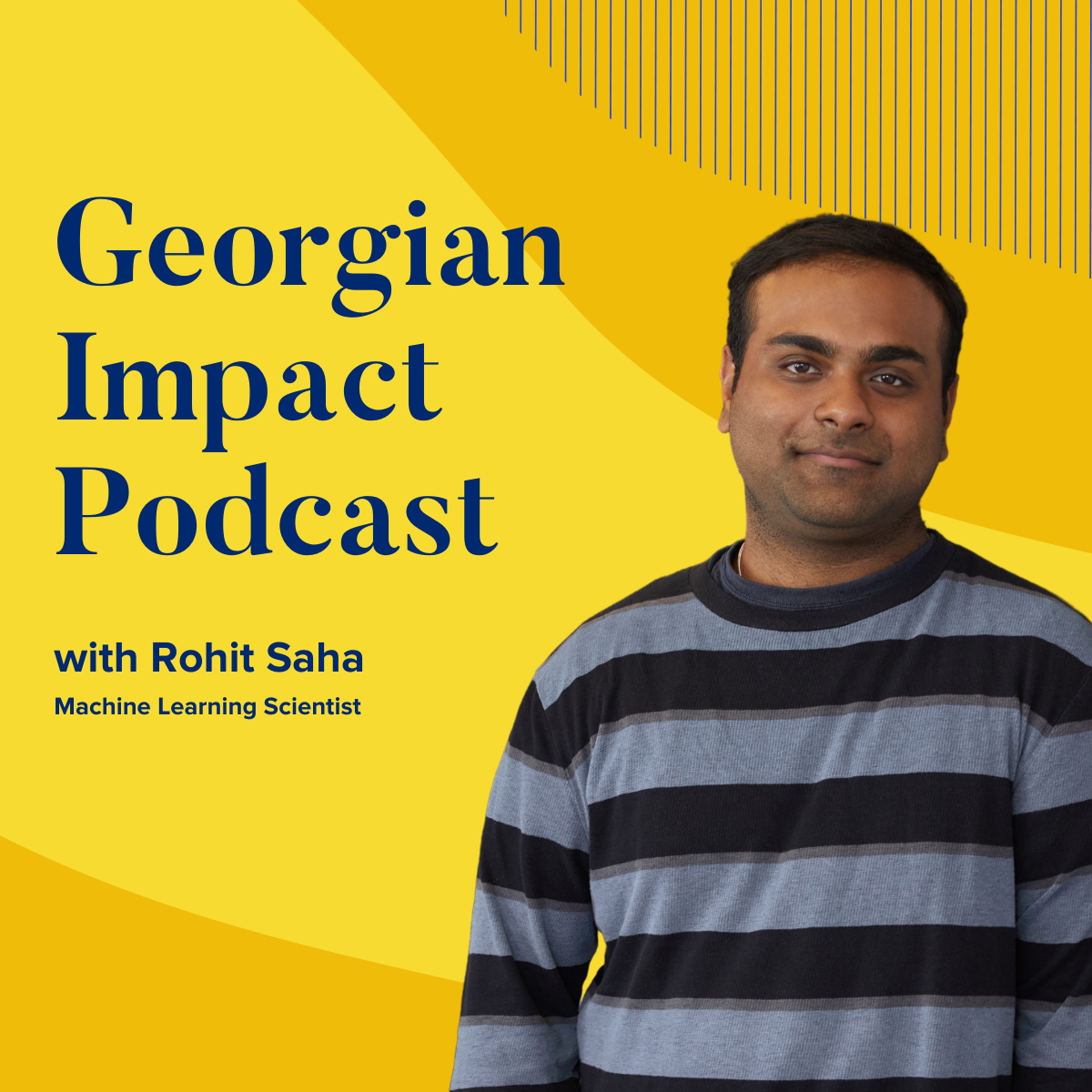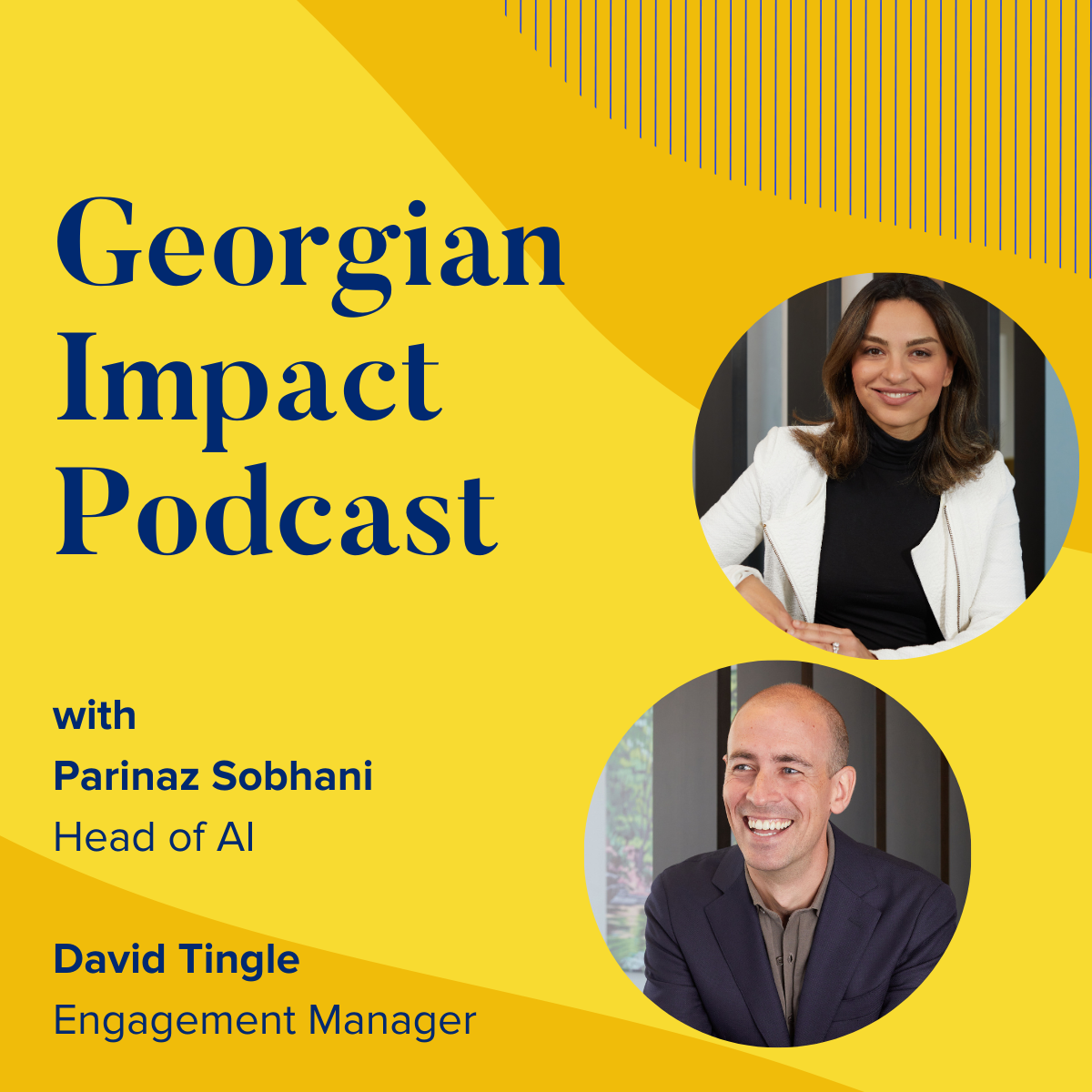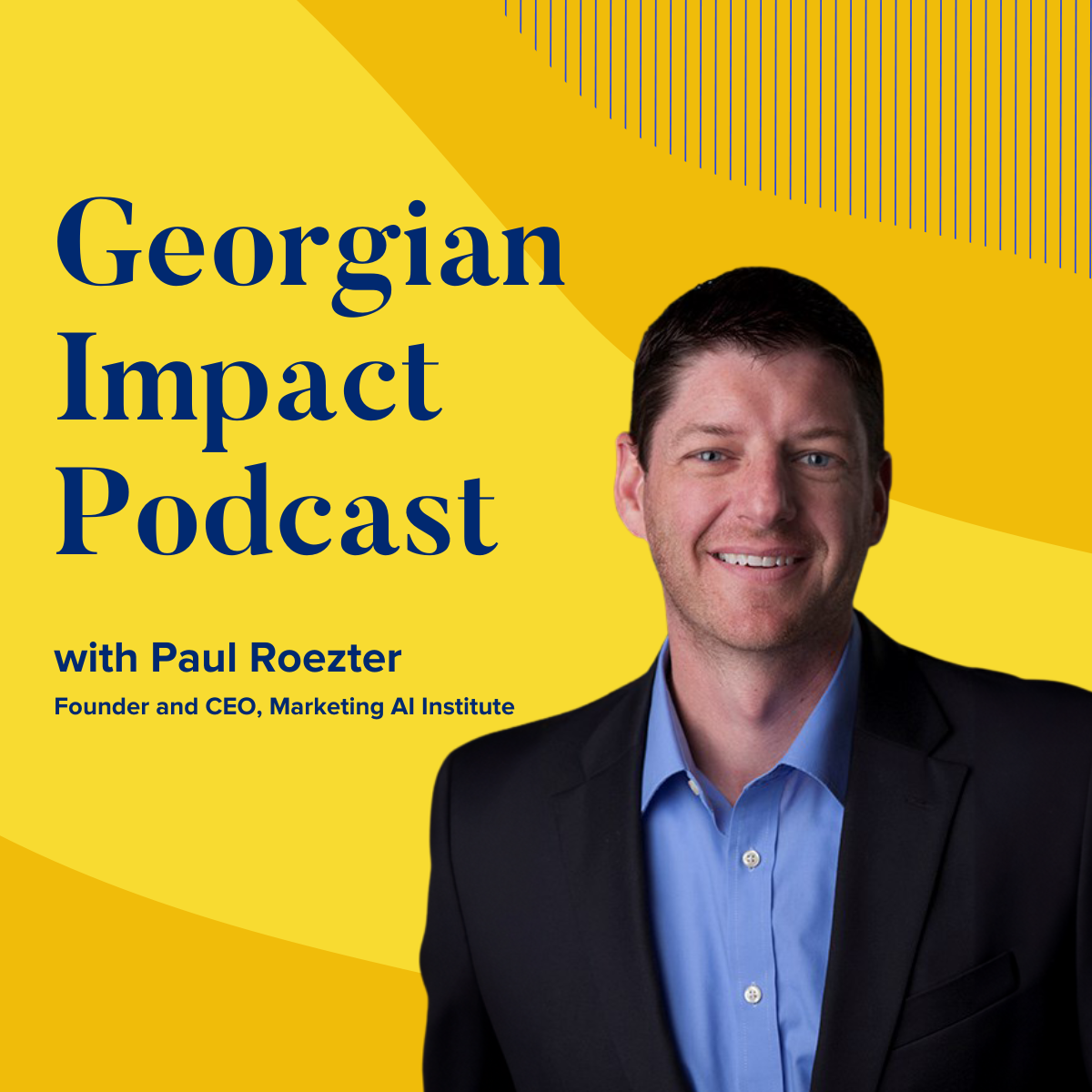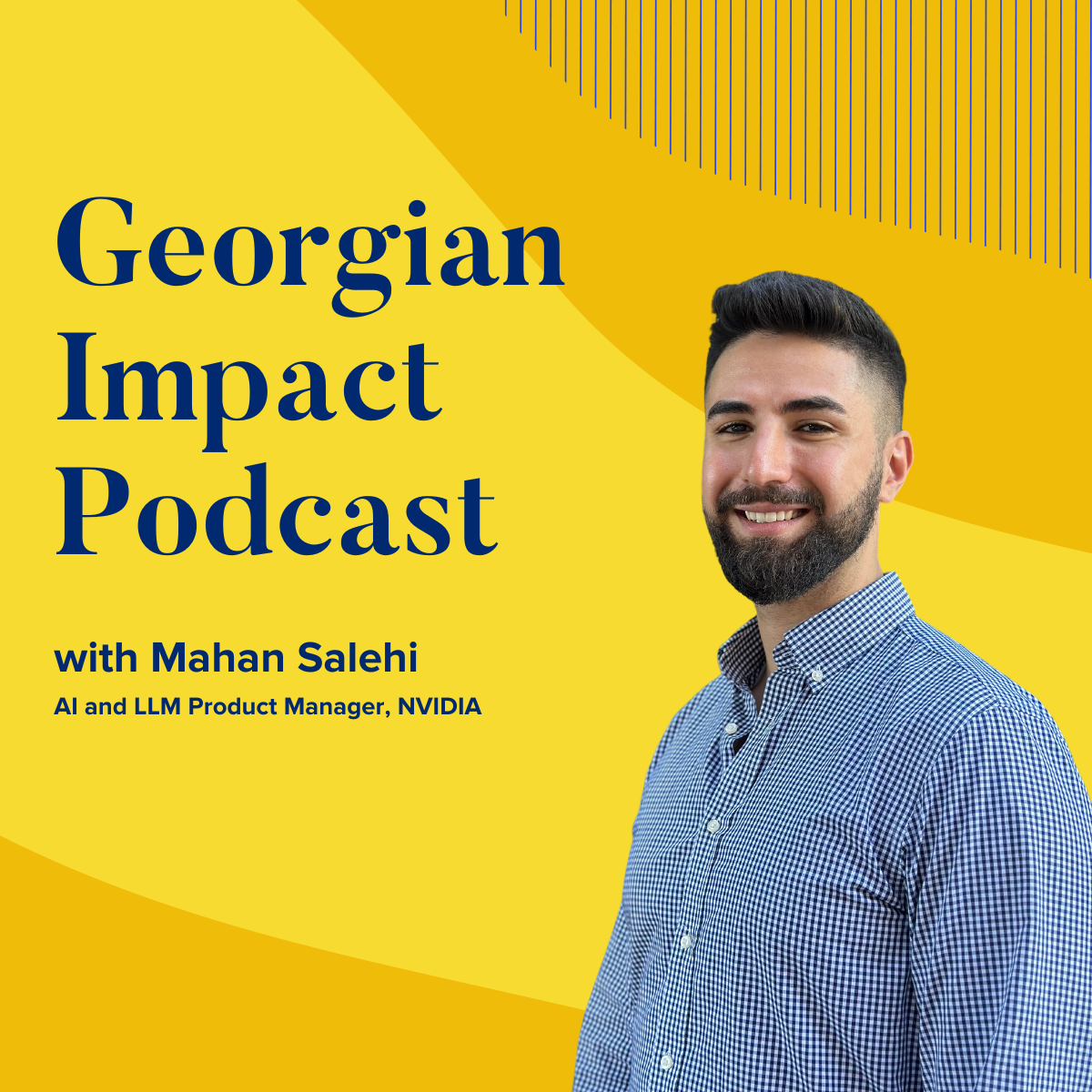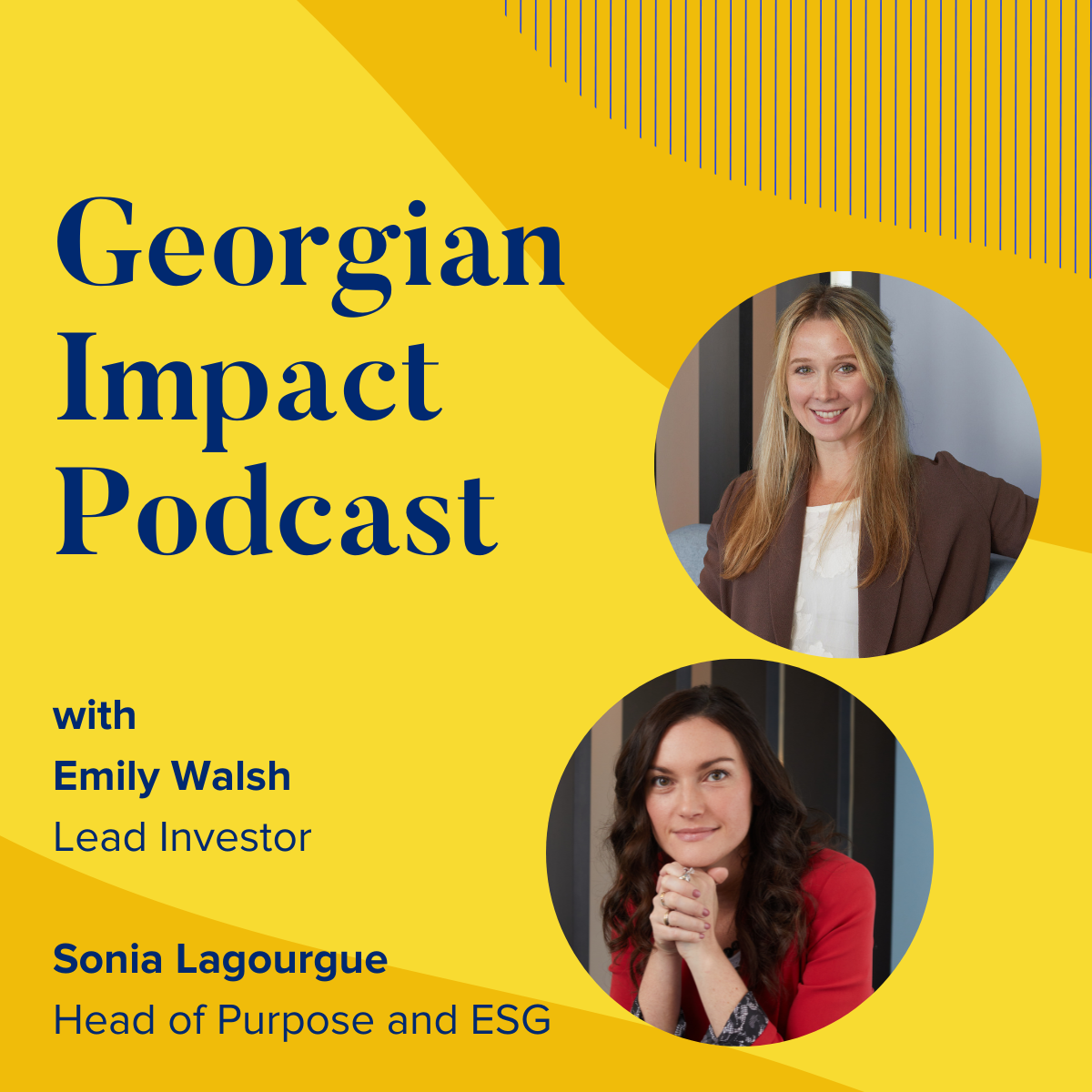AI in Marketing with Paul Roetzer
- 0.5
- 1
- 1.25
- 1.5
- 1.75
- 2
Jon Prial: Today, a discussion of marketing and the impact of technology. We have evolved from what really was a shot in the dark to marketing automation solutions that enable incredibly- detailed measurements. Brands relied on creators from individuals for mass marketing, think mad men, and yet most famous quote attributed to a well- known U. S. department store merchant, John Wanamaker was," Half the money I spend on advertising is wasted, the trouble is, I don't know which half." But now advertising is programmatic. Tools abound in the marketing automation submarket. We measure click- throughs dwell time. We do A/ B testing and so much more. CMOs are often called chief data officers. Today a conversation with Paul Roetzer, Founder and CEO of the Marketing AI Institute, as well as a consultancy, PR 20/20. Paul helps to transform companies marketing and he focuses on the current and future potential of AI, machine learning, deep learning, and cognitive computing. Don Draper, indeed. I'm Jon Prial, and welcome to Georgian's Impact Podcast. Welcome, Paul. Since John Wanamaker died in 1932, I don't want to go back that far, but I would like to go back about a decade or so. It was 2011, you published The Marketing Agency Blueprint, and I think the subtitle is important, The Handbook for Building Hybrid PR, SEO, Content, Advertising, and Web Firms. And then you follow that in 2014 with The Marketing Performance Blueprint. So, I'd like to get a sense since those are all data- driven, talk to me about what mattered then and why it matters that we can get to AI.
Paul Roetzer: So, interestingly enough when I wrote the first book in spring of 2011 I wasn't doing anything with AI yet. There's not a mention of AI in the first book, there's talk of marketing automation, specifically HubSpot because we were the first partner in HubSpot's ecosystem. But IBM Watson won on Jeopardy in January, February, 2011 right before I started working on the book. And so when I finished the manuscript for that first book, that was when my obsession with what is artificial intelligence and what role will it play in the future of marketing actually started. Then between that first book and the second book which I wrote spring of 2014 roughly, my world had changed. I had read Automate This by Christopher Steiner, I'd read probably five other books about AI. There were no marketing books about AI, there was no talk of AI within marketing but I had started to connect the dots. I had looked at the complexity of Wall Street logistics, all these other industries, healthcare, they were being disrupted by intelligent algorithms and not seeing an ounce of it in the field I spent all my time in. But I basically looked and said," Well, it's inevitable and sometime we will stop spending money on marketing automation that's human- powered and we will have machine- powered automation." And that was what sort of set things in motion. So in my second book we do talk about what happens when AI comes to marketing but it had not happened by 2014 either.
Jon Prial: Now, part of AI obviously is collecting good data. So I'm curious, you were HubSpot's first agency partner. How did you view the data they were collecting at that point in time in 2014?
Paul Roetzer: I didn't think about it. I mean, we started working with them in 2007, it wasn't on my roadmap. I'm not a data scientist, I'm not a machine learning engineer, I didn't think that way. The way I looked at it and I wrote it as my second book was every data point tells a piece of the story. So you should be using data in constructing what the customer journey is and then how you personalize that journey. So, that was about the extent of what I knew is that we even in 2014 saw many companies we dealt with weren't using the basics of Google Analytics to inform their strategy. Strategy in 2014 and even in many companies today is instinct, it's experience and instinct and educated guesses. Sometimes they use data, most of the times they don't. It's just what did we do before? Did it work? Should we do it again? And that's the challenge for a lot of CMOs or leaders of organizations, is they didn't get there by doing AI, they got there because they were great advertisers or they were great content marketers, or they were great at what they did and it elevated them to this role of leadership. They didn't do it using AI technology that automated things that they historically did with humans. So we're in this really weird stage where decision makers in the industry may be fearing that they're going to be obsoleted by the very thing they have the opportunity to integrate into their companies.
Jon Prial: I'd contend today and I want to evolve to talk about the 2021 State of Marketing AI Report that you did along with Drift. And we had a podcast with Drift just recently too which was pretty cool.
Paul Roetzer: Was that with Jeff Orkin, is that...
Jon Prial: Yes, it was with Jeff.
Paul Roetzer: Yeah, Jeff's awesome.
Jon Prial: Yeah. Jeff is most amazing. I'll contend that we really do have good skills around go- to market and I think it's the evolution and the recognition of the data that's there as well as just a wide range of software products that are out there that these tools that could be used by the go- to- market teams. What's your sense of the skills that are out there and the adoption rates of some of those newer AI- based technology?
Paul Roetzer: Very low. So in our research we asked understanding of terminology and capabilities of AI. 50% said they were beginner level in their understanding, 37% I think said intermediate. I don't question their answers, I question what intermediate is. So if we had given further context and said, intermediate means you could walk into the CMOs office right now, explain what AI is and its potential and list five sample use cases. You could confidently do that. You don't have to build anything, just explain it and why it's better than what you're doing. I would be shocked if 37% of the marketing industry could do that. I would be shocked if 3% of the marketing industry could do that. I think we're at the stage where people are aware of it. They understand it has big potential, but I don't know that we're that far along that people are actually highly competent in what it is and what it's capable of doing.
Jon Prial: Interesting. So there's a fear thing. I actually took the survey, it already had been closed but I wanted to see the questions. I think it was fantastic and I want to get into some of the questions and the use cases. The front- end for me was a little scary and it makes me think back when you were just mentioning what the CMOs thought about, what they did not know or do not know. You were asking people if they believe there'll be more or less jobs in marketing due to AI. And I'm going to save that for the close, I really want to talk about the future. But in the short- term, I do want to understand more about the different use cases, and you were really quite extensive in terms of asking people about the different questions that are there, whether it was SEO or reducing churn or it was fascinating, you added a question about writing email subject lines. How did you come up with the list? And then let's talk about some of the... We can't do them all but let's highlight some of the good ones.
Paul Roetzer: Again, I started studying AI in 2011. I'm a journalism major, I came out of journalism school. I'm a liberal arts major, businessman on a couple of companies, a marketer by trade after two decades. But when I tried to understand AI I couldn't. In 2011 the only people writing about AI were machine learning engineers and entrepreneurs in some companies. And I'm sorry, but they're not good at explaining it to the average person. And so there was this multi- year effort for me as this liberal arts background guy to try and understand this highly technical world, and then to try and be able to stand on stage and explain it to other people who came from my background. They're marketers, they're creatives, they're copywriters, their SEO people, they're not the engineers. And so it took me years to be able to make sense of it enough that I could then confidently explain it, and if there was machine learning engineers in the audience they wouldn't come up after me and be like," You're wrong. That is not what machine learning is." So years of work. But what I found was the best way to make it approachable to people is show them examples of something they do every day and explain to them how AI could help them do it more efficiently. And so in that process we started looking at this need to define use cases and to define them in categories of the things these people do. So again, if you think about advertising, or email marketing, or content marketing, show them 10 tactics or 10 activities that are commonly done in that area of marketing that you can say a machine can do this for you, all you have to do is find the tool. And so we basically started with that premise of how can we summarize dozens of common use cases that most marketers would touch or be familiar with? So not so specific that only an SEO person would understand this but optimize your website. Okay, if I'm a VP of marketing I need my site optimized, I need the granular detail. So that was really the origin of the dozens of use cases and actually it used to be 65, we've cut it down to 49, but it was common use cases that most marketing leaders would recognize as something their team does every day, and that was where we did it. And so it is not meant to be exhaustive, there are literally hundreds of them, but we wanted to get a representative sample of things that would commonly be done on a marketing team.
Jon Prial: And some things are easy to understand and actually easy to make that leap to understand how AI makes it better. I could do A/ B testing as a human being. I could just decide if I want to have a green button or a blue button, or you've got a great SaaS software model, a program that's up there looking at aggregated data and they'll do the automated A/ B testing for me and then put the best solution out there. That's magic. Did that get adjusted well?
Paul Roetzer: I look at that and say it's still flawed. Most people would A/ B test the landing page, they would come up with two versions, three versions, whatever they're going to do. You would modify a single variable on the page because you don't want to change all the variables, you don't know what worked, what didn't, and then you would select the winner. My argument is who are you to think you can predict that one or two variations is correct for the larger sample size if over time a machine could actually learn that I am going to click the blue button every time and you're going to click the orange? So why would I show a blue or an orange and assume one of those is the winner if I can show a flywheel or if I could use their social media to predict their personality, which then actually tells me what the more likely color is they would react to? So again, what you said is a data- driven approach. A machine learning driven approach is why are we limiting at two? Who are we to think we can actually pick even the two best? And so that's where I look at AI and say so much of marketing isn't even data- driven yet. It should be, but it's not. Even when you make it data- driven you're still now only to the next level, the level beyond that is intelligent A/ B testing, truly AI- powered, where it can personalize at scale.
Jon Prial: You just really reinforced your key point which is personalize two, because it doesn't just have to be red or green. It could be red for me and green for you if we start bringing more data in. So again, it's the data drives that, that's fantastic. Let's talk about one other one then, keywords. Again, maybe this is one of these human- driven ones that don't make a lot of sense that who's figuring out the right keywords for SEO or for purchasing ads. Do you think about how NLP is going to help figure out what the right keywords are or external third- party data might help drive keywords? How do you think about things like that?
Paul Roetzer: Yeah, so the one it might be the use case you're going to have to choose keywords and topic clusters for content optimization is a top one. So the thought there is when you're building a content strategy, so I'll move out of the advertising realm for a second and talk of content marketing. The way you would build a content strategy, what are we going to write about on our blog, what videos are we going to create? A common way to do it data- driven would be go look a keyword volume through Google. So what are the things people are searching? Or you could look at Google Trends data, or maybe you have SpyFu or like some SEO tool that tells you the volume of search for a specific keyword. That's great. That's better than nothing, that's better than guessing. But that doesn't tell you your domain's ability to rank for that keyword, or what are the other related keywords, or more importantly, what are the related questions people ask about that information. So rather than building a content strategy, I'm thinking about my Marketing AI Institute site, obviously I'm going to talk about artificial intelligence. But what else should I be talking about? How can I cluster that information? So if you think about AI and advertising, okay, great, I'm a little bit further. Let's create some content about AI's application to advertising, but what are the questions people have about it? Is it what tools should I be researching? Who are the influencers? What brands are doing it well? Keyword volume isn't going to tell me that, I could be looking at keyword volume all day and it's like should I call it AI in advertising or artificial intelligence in advertising? That's about where I'm going to get with keywords. But by clustering and looking at domain strengths, I can actually know what questions I should answer about AI and advertising that my domain has the best chance of ranking for.
Jon Prial: Context is much different than keywords.
Paul Roetzer: Yes.
Jon Prial: It really is, that's my assumption.
Paul Roetzer: And again, personalization, what do you want to know about AI in advertising, not what do I think the keywords tell me you might want to know?
Jon Prial: I'm fascinated. We've done a lot of discussions over the years in terms of building a data science team. And the one thing that we've said is if you're just a bunch of homogenous data scientists you're in trouble. And there's been lots of discussions about bringing in sociologists, bringing in liberal arts, bringing creatives, bringing artistics into the team. So who's part of your organization when you do this? You still have the backend techie folks or do you rely that with your customers? What do you bring to the table?
Paul Roetzer: We don't build anything. I mean, what we're doing is more of the consulting and really through the Institute it's more just teaching. It's the researching and understanding phase we're trying to connect the dots for you and then connect you with the right tools. But what I love and what you just explained is when you think about how Google builds things, or how Amazon builds things, or Apple. I heard a great story one time, it was actually an article I think on CNBC or something where the guy who was in charge of the Google Assistant was talking about how on that team were poets and philosophers and people from all these different backgrounds because if there was just the data geeks or the tech geeks, the bias would slip in that would affect what they did. I know Facebook does this with their Newsfeed team. But you need these different perspectives to be able to build a platform or a tool that actually looks at things from different angles. We had Angela Fan from Facebook did a keynote talk at our first marketing AI conference, and she told the story of how they were trying when they introduced smart replies into Facebook, where someone posts a comment and it would recommend what you would reply to them like you see in your text messages and everything, and emojis to use. They actually considered there are only had three options. So if you recommended the same things that someone in Silicon Valley would say as a response and you didn't consider geographical or demographic backgrounds of people, you could be affecting dialects of millions of people across the world by only giving them these suggestions. And so what should go into suggesting, and it's all AI- powered, like reading the comment, recommending what you're finding, that doesn't happen without AI, but that AI had to consider all of these variables to recommend the three simple things that seem simple at least
Jon Prial: Let's just step back and go long- term. So as these solutions are implemented, whether they're implemented in- house or they're done through a third party software solution, do you think they're sticky? Obviously there's great value in clouds and aggregating the data and a lot more value comes that way. Is it good? Do you think companies end up getting locked into soon or they have flexibility in terms of the different tools they're going to be added to their... I'll call it their marketing automation portfolio?
Paul Roetzer: Yeah. The complexities that AI creates for mark- tech stacks are significant and they haven't been solved yet, I have not seen anybody do a great report on that yet. Because as you know AI is trained to do very specific narrow tasks, so you don't go buy an AI for email marketing and all of a sudden everything you do in email- smart machine just does it all for you. You're going to buy a tool to write the subject lines. You're going to buy another tool that might actually help you write the copy. You're going to buy another tool that might recommend what CTA to include or what color to make the button. There's not a platform you're buying to do all these things. So you are literally just stacking tool on top of tool on top of tool. And until the major platform players that you work with integrate all this smart technology which is years away, you may be looking at an exponential increase in the number of tools needed over the coming three to five years. So, one of the things we always tell people is go talk to your core tech stack players first. If you're using Adobe or Oracle or HubSpot or Salesforce, whatever it is, talk to them first and say," Are there smarter AI- powered tools within your platform that we're not using?" Because ideally you just want to use the stuff that's native or that it's through an integration partner that you know integrates with that platform. You do not want to go get a bunch of AI tools that don't integrate with your CRM, your marketing automation, whatever your core tech stack pieces are.
Jon Prial: The worst thing you'd end up with siloed data.
Paul Roetzer: Yeah.
Jon Prial: They've each got their own set of... So I've got some degree of contextual integration in one company that's looking at recommendations and another set of siloed data looking at.. I already have a headache just thinking that.
Paul Roetzer: Yeah, I can get that.
Jon Prial: So, what do you think a go- to market team might look like five years from now in terms of. What do you tell someone joining a marketing team now in terms of skills that might be required, what jobs might be created in the future?
Paul Roetzer: Yeah, it's such a good question. Again it's a raw area of study. I haven't seen a great what does the future marketing org chart look like. I've had a lot of conversations, sit around have a drink with people and think about these kinds of things. One role I think will exist is a marketing AI ops role that would sit across all the areas of marketing and sales, maybe it's a marketing and sales ops I'm not sure. But someone who understands AI understands there's potential, understands how to find use cases, understands how to look at problems differently and value creation, look at matrix of solutions that can be more intelligent. It's going to be a while before the general marketer can do that, so I think you're going to have some highly trained people that aren't necessarily machine learning engineers, they can be re regular marketers who just take the initiative to understand this stuff. And so again they can just look at things differently. And so they can work with the demand team, or they can work with the audience team, or they can work with the customer service team and help them identify ways to make what they do smarter. I think that's a role... You're going to have roles developed to train the AI because as you know you don't get this stuff out of the box and it just works. There's human inputs, lots of human inputs to make AI work, so you're going to need people who train machines probably as part of the team. I think data scientists will play a much greater role within the marketing structure, either working together or sitting within, where right now they're often not necessarily part of the marketing team. Yeah, I don't know. I mean, that to me is one of the great unknowns. And one of the stories to be told is what are those careers? You saw in our study people generally feel, I think it was 53%, felt that AI will create more jobs than it takes away. I think there's optimism that new career paths will be created, we just don't know what they are right now.
Jon Prial: I love that conclusion and that's all I wanted to get to to kind of wrap this up. And you talked about that ops- type person straddling the different elements of marketing, but then you even said maybe even sales ops, so two different thoughts for you to react to. One, we talked about Drift, and Jeff Orkin at Drift and they do chatbot for both marketing automation and sales automation because there's so much similarity where you've got an early leader of qualified leads so their work... That's already a straddle point. I think the one that's more intriguing for me is when you think about content and messaging, which now can AI can help do so much a better job delivering that. All of a sudden the go- to market piece which used to be much more data- driven than the market management, market messaging, content manager piece seems to also blur, I see straddling there as well. So I think there's going to be an interesting evolution of someone's got to look across all of these elements because they do get tied together quite closely over time.
Paul Roetzer: Yeah, and I don't know if there's going to be a chief AI officer or anything like that. I mean, I have even taken the approach saying," I don't know whether you need an AI strategy per se, you need a smarter technology strategy." If you're still just buying marketing technology, so if you're doing email or content or automation or whatever it is, you're going to use technology to do it. My point is always, look people have built smarter versions of that. They've built AI- powered versions of that technology so if you're buying a content strategy tool it better have AI in it or they better have a really clear roadmap of how they're building it into it. Because if you're buying a tool now that you plan on having for three to five years and that company has no public point of view on AI or any apparent features of AI within it, I would not touch that tool right now because I believe as they'll be obsolete within three years.
Jon Prial: Sure. So the AI matters, the data matters. I think this convergence is interesting. The sales convergence with marketing to some degree, the messaging, I mean, there's an interesting what's the long- term career path? And maybe a CMO we always view as marketeers would to go become a CMO, but you could also be an amazing marketeer and really understand messaging and content and become a product manager- type person. Which I think the tech side has CTOs and VPs of engineering and product people. The product role could be an interesting evolution if you've really got that nailed down hard.
Paul Roetzer: Yeah, now, I mean, it's an interesting concept. And I think what it really takes is more people to understand what's possible so that more people are thinking about this exact thing or these related topics. It's, I'm not trying to solve all of this stuff I'm just trying to get people to care enough to ask the next question or read the next resource, that's our mission. It's just make the industry care because once you care you're going to be curious to go read something or take a course. And once you do that, if you don't get it and realize the world's about to change, I'll find a different career because if you don't understand AI within five years in marketing I'm not sure what your role is going to be.
Jon Prial: So those 50% beginners had better stop. They better move their way to intermediate pretty darn quick to have a productive conversation with bosses in terms of where this is going to go, where the data is going to deliver, what the solution could deliver? With the right type of outside of the box thinking still this is still not rote, this still takes creativity.
Paul Roetzer: It's so early. And that's my thing, is people shouldn't fear it at all, nobody gets this stuff. You have a chance now to take a leadership role in your organization to be the one to help figure this out, and to maybe find your own next career path within the organization or outside it. It's so early that it's just opportunity ahead and that's exciting to me. Some people I think get overwhelmed by it but to me it's, what are we doing this for? If the idea of being able to conceive of entire new career paths isn't exciting to you then, again, maybe it's just the wrong industry for you, I don't know.
Jon Prial: Well, I think the opportunity is there for the taking. I think you've really teased out what people could think about, what they can go after. The world is their oyster in terms of the world of marketing AI. This is fantastic. Paul Roetzer, thank you so much for taking the time to be with us today-
Paul Roetzer: Man.
Jon Prial: It's just a joy.
Paul Roetzer: Thanks for having me, I love to do it.
DESCRIPTION
Paul Roetzer is our guest on this episode of the Georgian Impact Podcast. He is the founder and CEO of Marketing AI Institute and PR 20/20. Paul helps transform marketing by focusing on the current and future potential of AI, machine learning, deep learning and cognitive computing.
Today's Host

Jon Prial

Jessica Galang
Today's Guests
